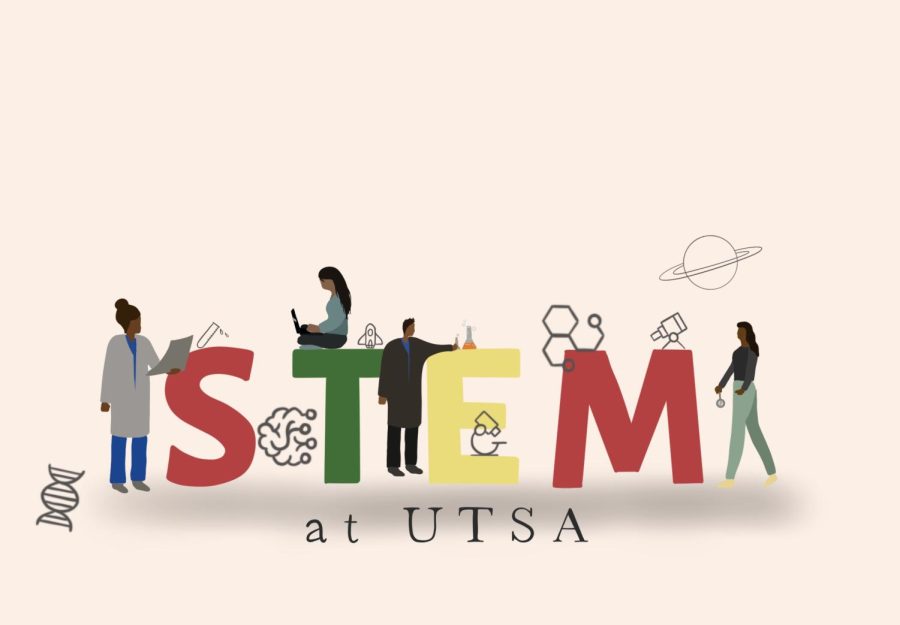UTSA awarded NSF grant to support Latino students in STEM
October 11, 2022
In September, the National Science Foundation (NSF) granted UTSA $3 million to support diversity, equity and inclusion in the Science, Technology, Engineering and Mathematics (STEM) field as a Hispanic Serving Institution (HSI).
“We applied for this transformation grant through the National Science Foundation’s HSI program,” Vanessa Sansone, assistant professor of higher education in the Department of Educational and Leadership Policy Studies, said. “And in the grant, we said ‘It’s not so much just enrolling [Latino students].’ We hear that all the time, enroll more, enroll more, but just because you are here on campus does not mean that that best serves you. You showing up [to school] should not be what universities get a pat on the back for. And so in our proposal, we talked about really concentrating on that transformation piece. It is not enough to just say we are going to get more Latino students into STEM. We are going to look at our policies and procedures to see where this [is] disadvantaging Latino students.”
With this grant, UTSA will work to implement a more culturally-inclusive curriculum and address external issues such as housing inequities and food insecurities.
“We are addressing policy,” Sansone said. “Specific examples of that are transfer policy, but also how do we onboard students? What happens in advising? What happens when students get into an area of academic dismissal? Maybe those things are not serving our students very well and they need to be looked at again. A lot of times policy is very black-and-white. And it best serves students when it is gray. It is our responsibility to make sure that we are thinking about how to serve you well, because if our policies, procedures and practices don’t reflect what serves our students best then we need to address that.”
In addition to addressing student needs, the grant will also assist in funding three Ph.D. fellowships.
“There is some funding in there to support students at the graduate level,” Sansone said. “We have, for example, a postdoc position. We also are funding three Ph.D. fellowships in the College of Engineering, and then three Ph.D. fellowships in my department, [the] College of Education Policy Studies, because those students will be working on this project at the same time while pursuing their Ph.D. studies here at UTSA.”
To determine what will best suit Hispanic students at UTSA, Sansone and her team will be randomly selecting Latino STEM students to interview.
“Our hope, though, is that we’re going to learn,” Sansone said. “[Affordability is] something we are going to talk to students about. So one of the first things that will happen with this grant is I am actually going to talk to STEM students, and particularly STEM Latino students to ask them, ‘Are we serving you well?’ From that conversation, [we will] learn because a lot of times institutions make policies and procedures without talking to their students. I am also going to talk to staff, which is another population that tends to not be given an opportunity to voice [concerns], because [they] play a big part in serving students really well. And so if they are not being heard, and we are not learning from them, that’s a big miss in my book.”
Professor Sansone stressed the significance of UTSA being chosen as the recipient of a large sum of money.
“I have to say that as somebody who’s an expert on Hispanic Serving Institutions, I know a lot about them generally,” Sansone said. “And most of the time, it is Hispanic Serving Institutions that get awarded less funding, like 500,000 [dollars], which is a lot of money, but when you are proposing to do a lot of transformation to [accomplish] some big goals, that money goes quickly. So this is a big deal for us.”
As a two-time alumna of UTSA, Sansone is proud to have been a part of obtaining the grant.
“I am much closer to fulfilling personal goals of mine, to uplift my own community,” Sansone said. “And quite honestly, I love UTSA. I think our students are the best at the end of the day and they sometimes are dealing with things outside of their power that have to do with legacies of injustice. This is a way for us to possibly address some of that.”
Professor Sansone can be contacted via email at vanessa.sansone@utsa.edu. To read more about the grant, visit https://www.utsa.edu/today/2022/09/story/university-awarded-nsf-grant-for-hispanic-and-underrepresented-stem-students.html.







